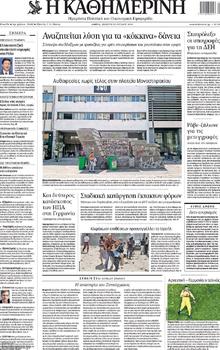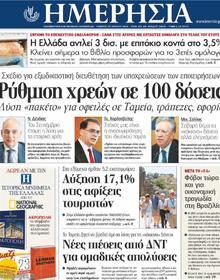 |
KATHIMERINISearching for a solution for unserviced business loans A meeting at the Prime Ministerial mansion with bankers over business debts and market liquidity The management of the ‘red’ loans and bank funding of healthy businesses in order to promote economic activity was the subject of a meeting which took place yesterday in the prime ministerial mansion chaired by Antonis Samaras and in which the heads of Piraeus Banks, Alpha Bank, the National Bank of Greece and Eurobank took part. The government and the banks will search for a framework for the handling of outstanding loans with the aim of supporting sustainable businesses and in order for social problems to be avoided. The Economic Development Minister Nikos Dendias stressed that the new framework will soon be ready. The president of Piraeus Bank noted that the problem of unserviced loans is serious but under control and manageable, and will be gradually handled. He also underlined the fact that the banks will not need further recapitalisation. According to sources, the Development Ministry is preparing a plan which would provide for ‘ala carte’ refinancing of the debts of healthy businesses, not only towards the banks but towards the state and social security funds. |
 |
EFIMERIDA TON SYNTAKTONA dangerous games with institutions The desperate attempt of the government to avoid a parliamentary debate about the referendum for the privatisation of the ‘small PPC’
'You are not only afraid of a referendum but of a plenary session of parliament,' Alexis Tsipras said. Eight 'reserve' MPs were recruited in order to reach 51 yes votes. [The summer session of parliament has 100 MPs compared to the 300 of the plenary] |
 |
ELEFTHEROTYPIA13 red lines from the troika
|
 |
IMERISIANew pressures from the IMF over mass layoffs Prices remain high despite wage cuts The representative of the IMF, speaking at a conference organised by the Economist in Athens stressed the need for fiscal adjustment to continue with further interventions in the labour market. |
 |
AGGELIOFOROS50,000 businesses shuttered in three years Approximately 50,000 businesses were removed from the register of the 18 chambers of commerce of Macedonia and Thrace between 2011-2013. At the same time 35,456 new businesses registered with the chambers, but it will be very difficult for them to counterbalance the loss of those that were ‘removed from the game’. Those which shut included a high proportion of productive businesses and each one employed between 1 and 50 people. On the other hand those which opened are mainly businesses in the food and drink sector which employ between one and two workers. |
Press Review July 10: Dealing with unserviced business loans worth billions
The government and the banks seek a solution over billions in unserviced business loans; the government seeks to avoid a parliamentary debate over a referendum for the PPC privatisation; the troika keeps the pressure on over demands for reforms and fiscal measures; the IMF stresses the need for mass layoffs in the private sector; and 50,000 businesses closed in northern Greece in just 3 years. Photo by Images_of_Money via Flickr.
Σε χρειαζόμαστε
Το ThePressProject είναι το μοναδικό μέσο ανεξάρτητης, ερευνητικής και αποκαλυπτικής δημοσιογραφίας που στηρίζεται αποκλειστικά στις μικρο-δωρεές των επισκεπτών του. Πιστεύουμε ότι η πληροφορία πρέπει να είναι διαθέσιμη σε όλους και για αυτό δεν κλειδώνουμε κανένα κομμάτι της ύλης αλλά για να παραχθεί το πρωτογενές υλικό που θα βρείτε εδώ χρειαζόμαστε την υποστήριξή σου. Αν δεν πληρώσουμε εμείς για την ενημέρωσή μας, θα την πληρώσει κάποιος άλλος (και αν δεν είσαι ο Μαρινάκης μάλλον δεν έχεις τα ίδια συμφέροντα). Μάθε πώς
- Κάνε κλικ για να σχολιάσεις
Πολιτική Σχολιασμού